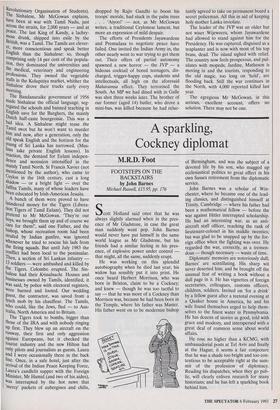A sparkling, Cockney diplomat
M.R.D. Foot
FOOTSTEPS ON THE BACKSTAIRS by John Barnes Michael Russell, £15.95, pp. 176 Scott Holland said once that he was always slightly alarmed when in the pres- ence of Mr Gladstone, in case the great man suddenly went pop. John Barnes would never have put himself in the same world league as Mr Gladstone, but his friends had a similar feeling in his pres- ence, of explosive power under control that might, all the same, suddenly erupt.
He was working on this splendid autobiography when he died last year; his widow has sensibly put it into print. He once heard Herbert Morrison, who was born in Brixton, claim to be a Cockney; and knew — though he was too tactful to say — that he was more of a Cockney than Morrison was, because he had been born in the Temple, where his father was Master. His father went on to be modernist bishop of Birmingham, and was the subject of a devoted life by his son, who mugged up ecclesiastical politics to great effect in his own Sussex retirement from the diplomatic service.
John Barnes was a scholar of Win- chester, where he became one of the lead- ing classics, and distinguished himself at Trinity, Cambridge — where his father had been a mathematical fellow — before the war against Hitler interrupted scholarship. He had an interesting war, as an anti- aircraft staff officer, reaching the rank of lieutenant-colonel in his middle twenties; but was glad to be snapped up by the for- eign office when the fighting was over. He regarded the war, correctly, as a tremen- dous — though necessary — waste of time.
Diplomats' memoirs are notoriously dull; Barnes' are scintillating. His sharp wit never deserted him; and he brought off the unusual feat of writing a book without a dull page in it. He has vignettes of foreign secretaries, colleagues, customs officers, children, soldiers. Invited on 'for a drink' by a fellow guest after a teetotal evening at a Quaker house in America, he and his wife found themselves urged to help them- selves to the finest water in Pennsylvania. He has dozens of stories as good, told with grace and modesty, and interspersed with a great deal of common sense about world affairs.
He rose no higher than a KCMG, with ambassadorial posts at Tel Aviv and finally at the Hague; it seems a fair conjecture that he was a shade too bright and too con- tentious to be acceptable right at the sum- mit of the profession of diplomacy. Reading his dispatches, when they go pub- lic, will clearly enliven research for many historians; and he has left a sparkling book behind him.






















































 Previous page
Previous page